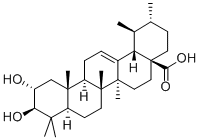Corosolic acid is a triterpenoid that has been found in L. speciosa leaves and has diverse biological activities, including anticancer, anti-inflammatory, antidiabetic, antihypertensive, antihyperlipidemic, and antioxidant properties. It is cytotoxic to HepG2, A549, SNU-C4, HeLa S3, and K562 cells (EC50s = 4.8, 5, 0.4, 1, and 4.3 μg/ml, respectively). Corosolic acid inhibits ear edema in mice induced by phorbol 12-myristate 13-acetate (TPA; ) with an ID50 value of 0.09 mg/ear. It reduces blood glucose levels in an insulin tolerance test in a KKAy mouse model of type 2 diabetes when administered at doses of 2 and 10 mg/kg. Corosolic acid (0.072% in the diet) reduces systolic blood pressure and serum levels of free fatty acids, the oxidative stress markers thiobarbituric acid-reactive substances (TBARS) and 8-hydroxy-2’-deoxyguanosine (8-OHdG), and the myeloperoxidase markers 3-nitrotyrosine and 3-chlorotyrosine in an SHR/NDmcr-cp (cp/cp) rat model of metabolic syndrome.

